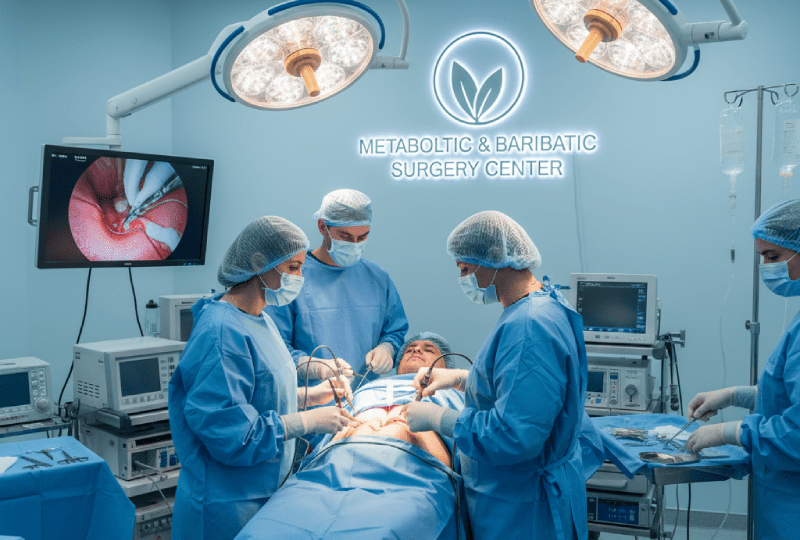The Role of Obesity and Surgery
Obesity is considered one of the most significant health problems of our time. This chronic disease, characterized by an excessive accumulation of body fat, leads to many serious health issues such as diabetes, hypertension, heart disease, and sleep apnea. For individuals who cannot achieve lasting weight loss with traditional methods like diet and exercise, surgery, or bariatric surgery, stands out as an effective and long-term solution. Surgery not only addresses aesthetic concerns but also helps in the remission or complete resolution of obesity-related diseases.
What is Bariatric Surgery?
Bariatric surgery is the general name for surgical procedures used in the treatment of obesity, aiming for weight loss by making changes to the stomach and/or digestive system. These surgeries work on two basic mechanisms: restriction (reducing stomach volume) and malabsorption (reducing nutrient absorption). Most modern bariatric surgeries use a combination of these two mechanisms to achieve maximum effect. The goal is to make the person feel full with less food and to absorb fewer calories from the food they consume.
Who is a Candidate for Bariatric Surgery?
Candidacy for bariatric surgery depends on specific criteria. Generally, individuals with a Body Mass Index (BMI) of 40 or higher, or a BMI of 35-39.9 with serious obesity-related health problems like type 2 diabetes, hypertension, or sleep apnea, are considered candidates. Furthermore, the individual’s willingness and determination to adhere to lifestyle changes after surgery are of vital importance. Candidates undergo a comprehensive physical and psychological evaluation process.
The Pre-Surgical Evaluation Process
Before the decision to operate is made, patients are subjected to a detailed evaluation by a multidisciplinary team. This team includes a bariatric surgeon, a dietitian, a psychologist, and an anesthesiologist. The evaluation aims to determine the patient’s general health status, eating habits, psychological readiness, and surgical risks. All necessary tests (blood tests, endoscopy, ultrasound, etc.) are performed to ensure the patient is in the most suitable condition for surgery.
Sleeve Gastrectomy
Sleeve Gastrectomy is one of the most frequently performed bariatric surgery methods today. In this procedure, approximately 75-80% of the stomach is surgically removed, and the stomach is reshaped into a tube resembling a banana. The surgery both reduces the stomach’s volume and eliminates the fundus region, where the hunger hormone ghrelin is largely secreted. This allows the patient to feel full with less food and experience a significant reduction in appetite. It is usually performed using a laparoscopic (minimally invasive) method.
Roux-en-Y Gastric Bypass
Roux-en-Y Gastric Bypass is both a restrictive and malabsorptive surgery. In this operation, a small stomach pouch (approximately 30 ml) is created from the upper part of the stomach. A section of the small intestine is cut and attached to the end of this pouch (the Roux limb). The remaining part of the small intestine (where bile and pancreatic secretions come from) is reconnected to the Roux limb at a lower point. This restricts the amount of food consumed and shortens the path of nutrient absorption, reducing calorie absorption.
SADI-S Operation
SADI-S (Single Anastomosis Duodeno-Ileal bypass with Sleeve Gastrectomy) is a newer and more powerful metabolic surgery method. This surgery is a combination of sleeve gastrectomy and gastric bypass. First, a sleeve gastrectomy is performed, and then a section of the small intestine is cut and connected to the duodenum with a single anastomosis (connection). SADI-S is a particularly effective option for individuals with severe obesity and metabolic diseases. It provides high weight loss and excellent diabetes control.
Gastric Plication
Gastric Plication is a surgery in which the stomach is reduced in size without being cut or having a part of it removed. The stomach is folded and secured with sutures to reduce its volume. This method is less invasive than other bariatric surgeries and does not create a permanent change in the anatomy of the digestive system. However, its long-term weight loss success and sustainability can be lower compared to methods like sleeve gastrectomy or gastric bypass. Therefore, it is less commonly preferred today.
Adjustable Gastric Band
The Adjustable Gastric Band is a procedure where a silicone band is placed around the upper part of the stomach. This band is inflated to narrow the entrance to the stomach, creating a feeling of fullness. The procedure is reversible, and the tightness of the band can be adjusted. However, it has lost popularity due to long-term complications (band slippage, erosion) and inadequate weight loss. It is now rarely performed in modern bariatric surgery, and other methods are considered more successful.
Duodenal Switch
Duodenal Switch (DS) is one of the most powerful and complex bariatric surgery methods. In this surgery, the stomach is reduced, and a large portion of the small intestine is bypassed. It has both a restrictive and a very powerful malabsorptive effect. It may be preferred in cases of morbid obesity where other methods have failed. It provides very high weight loss and is extremely effective on diabetes. However, it also brings the risk of vitamin and mineral deficiencies to the highest level.

Which is the Most Successful Surgery?
The definition of “most successful” surgery varies from person to person. The success of a surgery is measured not only by the amount of weight lost but also by the improvement of obesity-related diseases, the increase in quality of life, and the long-term sustainability of the operation. Generally, surgeries with a malabsorptive effect (Gastric Bypass, Duodenal Switch, SADI-S) result in more weight loss. However, the most commonly performed surgery with a high average success rate is considered to be Sleeve Gastrectomy.
Long-Term Weight Loss Rates
Weight loss rates after bariatric surgery vary depending on the type of surgery. Patients who undergo sleeve gastrectomy typically lose 60-70% of their excess weight, while those who undergo gastric bypass can lose 70-80%. In more aggressive surgeries like Duodenal Switch and SADI-S, these rates can exceed 80%. However, these are average figures, and the patient’s adherence to lifestyle changes is the most important factor in determining the permanence of the results.
Effects on Metabolic Diseases
Bariatric surgery not only leads to weight loss but also significantly improves or puts into remission metabolic diseases such as type 2 diabetes, hypertension, and high cholesterol. Especially surgeries like gastric bypass and SADI-S, thanks to the changes they create in digestive hormones, can have an almost immediate effect on diabetes. These surgeries are even considered a “cure” for diabetes.
Change in Eating Habits
One of the biggest challenges for patients after surgery is completely changing their eating habits. Because the stomach volume is reduced, it is essential to eat less and more slowly. Small portions, eating at frequent intervals, and the transition from liquid to solid foods form the basis of this process. The surgery is a “tool,” but success depends on how well the patient adapts to the new rules and healthy eating principles.
Psychological Support and Preparation
The psychological factors underlying obesity are critical for surgical success. Surgery does not eliminate food addiction, emotional eating, or other psychological issues. Therefore, receiving psychological support before and after surgery is important for the patient to adapt to the new lifestyle and establish a healthy emotional relationship with food. The psychological evaluation performed before surgery determines whether the patient is ready for this process.
The Role of Physical Activity
Physical activity is essential for the lasting success of bariatric surgery. It accelerates the weight loss process, preserves muscle mass, and boosts metabolism. Patients should start with light walks in the first few weeks after surgery and gradually increase the intensity of exercise with their doctor’s approval. Various activities such as swimming, cycling, and strength training contribute to both physical and mental health.
Post-Surgical Follow-up
Post-surgical follow-up is vital to ensure success. Regular visits with the bariatric surgeon, dietitian, and psychologist allow for monitoring both physical and mental health. Blood tests are performed to check vitamin and mineral levels, the diet plan is reviewed, and potential complications can be detected early. These follow-ups ensure the patient stays healthy in the long term.
Common Risks of All Surgeries
As with all surgical procedures, there are some risks associated with bariatric surgery. These include reactions to anesthesia, infection, bleeding, blood clots, and problems with wound healing. Thanks to modern laparoscopic techniques and experienced surgeons, these risks have been minimized. However, every patient is unique, and risk factors can vary from person to person. These risks should be discussed in detail with the patient by the surgeon.
Specific Risks of Sleeve Gastrectomy
Sleeve gastrectomy has some specific potential risks. One of the most important is the risk of a leak from the staple line after surgery. This is a rare but serious complication that requires immediate intervention. Another risk is an increase in acid reflux due to the reduced stomach size. This condition can usually be controlled with medication, but some patients may require surgical intervention.
Specific Risks of Gastric Bypass
Among the specific risks of gastric bypass surgery, “Dumping Syndrome” stands out. This is a condition caused by sugary or fatty foods moving too quickly into the small intestine, leading to symptoms like nausea, diarrhea, abdominal cramps, and weakness. Furthermore, since the surgery affects nutrient absorption, there is a high risk of vitamin and mineral deficiencies such as iron, vitamin B12, and calcium. Therefore, lifelong supplementation is necessary.
Specific Risks of SADI-S
The SADI-S operation, in addition to its high weight loss potential, is one of the surgeries that most affects nutrient absorption. As a result, the risk of deficiencies in protein, fat, and fat-soluble vitamins (A, D, E, K) is even higher after surgery. Patients must adhere to a very careful diet and a regular supplementation program to address these deficiencies. These risks must be balanced with the benefits provided by the surgery.
Revision Surgery
In some cases, the initial bariatric surgery may not lead to sufficient weight loss or may cause persistent complications. In such situations, patients may need revision surgery. Revision surgeries can vary depending on the type of initial surgery and the patient’s condition. For example, a patient who did not achieve sufficient weight loss after a sleeve gastrectomy may undergo a gastric bypass. Revision surgeries are generally more risky and complex.
A New Beginning
Bariatric surgery is not a magic bullet. This surgery provides the patient with a powerful tool to transition to a healthy lifestyle. The post-surgical process requires not only a physical transformation but also a mental one. Patients should view the surgery not as an “end” but as the beginning of a new life. This new life is shaped by regular exercise, healthy eating, and conscious choices.

The First Few Weeks
The first few weeks after surgery are critical for recovery and adapting to new eating habits. Patients must follow a diet plan specified by their doctor. This program usually consists of several stages: first, only liquid foods (water, broth, protein supplements), then pureed foods, and finally soft, solid foods. Strictly adhering to these stages ensures the stomach’s healing.
Why is Protein Intake Important?
Protein intake after surgery is vital for preserving muscle mass and achieving healthy weight loss. Insufficient protein intake can cause the body to burn muscle tissue and slow down metabolism. Patients are advised to consume protein-rich foods (chicken, fish, eggs, yogurt) with every meal and take protein supplements if necessary. This also increases the feeling of fullness.
Vitamin and Mineral Supplements
After bariatric surgery, especially in operations with a malabsorptive effect like gastric bypass and SADI-S, vitamin and mineral deficiencies are inevitable. Patients must regularly take supplements such as iron, vitamin B12, vitamin D, and calcium for life. Everyone who has had the surgery should monitor their deficiencies with regular blood tests and follow the supplementation program recommended by their doctor.
The Importance of Hydration
Adequate fluid intake after surgery is very important to prevent dehydration and keep the metabolism active. Due to the small stomach volume, it is difficult for patients to drink a lot of water at once. Therefore, it is recommended to sip water throughout the day. Fluid consumption with meals should be avoided, as this can quickly fill the stomach pouch, increasing the feeling of fullness and preventing the intake of solid food.
Portion Control
The most fundamental principle of bariatric surgery is the reduction of portions. After surgery, patients must be content with portions the size of a small cup or a tea saucer. Each meal should be consumed not until full, but according to the specified portion size. Portion control is the key to lasting weight loss and yields the best results when combined with the restrictive effect provided by the surgery.
Social Interactions and Restaurant Visits
Social life after surgery can be challenging, especially at food-centered gatherings. Patients must learn to order small portions at restaurants, eat slowly, and pack up their leftovers when necessary. Explaining the situation to those around them and asking for support makes this transition easier. Focusing on conversation and other activities instead of food at social events accelerates adaptation.
Pregnancy After Surgery
Weight loss after bariatric surgery can increase fertility. However, experts recommend avoiding pregnancy for at least 12-18 months after the surgery. This period is important for the health of both the mother and the baby. The body is in a process of significant change and adaptation during this time. When a pregnancy is planned, the patient must work with their gynecologist and bariatric surgeon to determine their nutritional and supplementation needs.
Surgical Costs
Bariatric surgery costs vary depending on the type of surgery, the hospital’s location, the surgeon’s experience, and the services provided with the surgery (dietitian, psychologist support, follow-up processes). The costs of surgeries performed in private hospitals in Turkey are determined by the country’s economic conditions and health tourism. While it’s not possible to give a precise figure, it is best to get detailed information from hospitals before making a decision.
Insurance Coverage
Bariatric surgery may be covered by some private health insurance plans and state insurance (Social Security Institution) under certain conditions. Generally, for insurance to cover the surgery, the patient must have a BMI above a certain level, prove that they have been unable to lose weight with methods like diet and exercise before, and be psychologically ready. It is important to carefully examine the policy conditions of your insurance company.
Success Stories and Realities
Bariatric surgery is a life-changing experience for many people. Success stories can inspire those who want to embark on this journey. However, it is also important not to forget the realities behind these stories. Every successful outcome is achieved through the patient’s commitment, perseverance, and determination to the new lifestyle after surgery. The surgery is a beginning, and the real challenge is this lifelong journey of change.
Choosing the Right Doctor
Bariatric surgery is a field that requires experience and expertise. Choosing the right surgeon and a multidisciplinary team is vital for a successful outcome. It is important to get information about the number of surgeries the surgeon has performed, their expertise in the field, the hospital conditions, and the post-operative follow-up processes. A reliable team provides the best care both during and after the surgery.
Personal Decision
In conclusion, there is no “most successful” surgery, there is only the right decision. This decision should be made based on the individual’s general health, lifestyle, expectations, and the surgeon’s recommendations. Every individual’s journey is different, and bariatric surgery is one of the most important steps taken in this long-term process. Every conscious step taken on this journey illuminates the path to a healthy and happy future.



